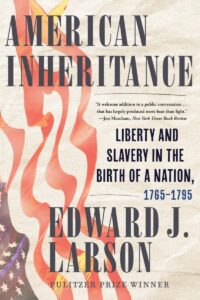American Inheritance: Liberty and Slavery in the Birth of a Nation – Edward J. Larson
 American Inheritance: Liberty and Slavery in the Birth of a Nation. By Edward J. Larson. (New York: W. W. Norton & Company, 2023. pp. 358. Cloth, $32.50.)
American Inheritance: Liberty and Slavery in the Birth of a Nation. By Edward J. Larson. (New York: W. W. Norton & Company, 2023. pp. 358. Cloth, $32.50.)
In American Inheritance: Liberty and Slavery in the Birth of a Nation, Edward J. Larson sets out to chart the simultaneous trajectories of the quest for liberty and the institution of slavery at the birth of the United States. This is not a new topic, and there isn’t really much that is presented here that is new. The book skews heavily toward political and legal sources, also not a new tactic. Enslaved characters are seen through white eyes. Maybe that is the fault of a paucity of sources, but it leads room for further research or perhaps points back at reading other work already done.
Larson focuses on politicians and generals, great white men who made decisions shaped thousands, millions, of enslaved’s lives, and continue to shape race relations in America to this day. There is nothing here that really gives the enslaved a voice, despite frequently inserted anecdotes about slaves like Phillis Wheatley and Ona Judge, and free Blacks like Benjamin Banneker. The majority of the text feels like Black voices are lost in Larson’s narrative. Their stories are told through the eyes of their enslavers. Whites and their contentious battle over the fate of slavery is what is on view here.
The strength of American Inheritance is that it collates a body of scholarship on the conflicting values of liberty and slavery between late colonialism and into the early republic in a way that may be digestible to a reader newly interested in the topic, or one looking for a broad overview. Larson’s arguments are cogent without getting too bogged down in specific details, a good read for someone with a more casual interest. But, as noted above, this general overview loses some of the oomph of more academically-minded, or at least more detailed, historical scholarship.
This is a very nuanced topic that still raises debates and drives violence and inequality to this day. At the time, Larson notes, such arguments over liberty and slavery drove colonial America to rebel against the British, comparing their status as unfairly taxed British colonists to enslaved Blacks. These beliefs revealed how deep personal debates over liberty and slavery were:
Patriot invocations of slavery were often not philosophical arguments based on abstract notions of freeman in a state of nature. They were intensely emotional appeals that relied for their force on a familiarity with chattel slavery and an equation of Blacks with such bondage. (51)
Then, as now, racial identities have been used to construct and galvanize ideologies surrounding liberty and oppression. By failing to adequately address the cognitive dissonance of the co-existing ideals of liberty and slavery, founding Americans refused to remove a splinter that would grow to an egregious wound as evidenced by the Civil War, a wound barely half-healed that still festers to this day. For early Americans, a strong federalist government trumped ending slavery; economic interests colored by ideological racism and distorted ideas of who was enslaved and who was not perpetuated the institution of slavery until the issue became one that Americans could no longer compromise away. The Civil War may have ended slavery, but the failure of Reconstruction and the violent backlash against the modern Black rights movements abetted by a former president (and presidential candidate) eager to manipulate racial tensions for votes has left us with a battle surrounding liberty and race to this day.
As mentioned, American Inheritance is a good synthesis of scholarship on the inextricable issues of liberty and slavery that persist into the twenty-first century. Anyone wanting to understand that backdrop of our current passionate debates involving race would use this as a good starting point, but I would encourage readers to look more deeply into the scholarship to get more specific investigation of these twinned subjects, and to perhaps find the Black voices that are missing here.
